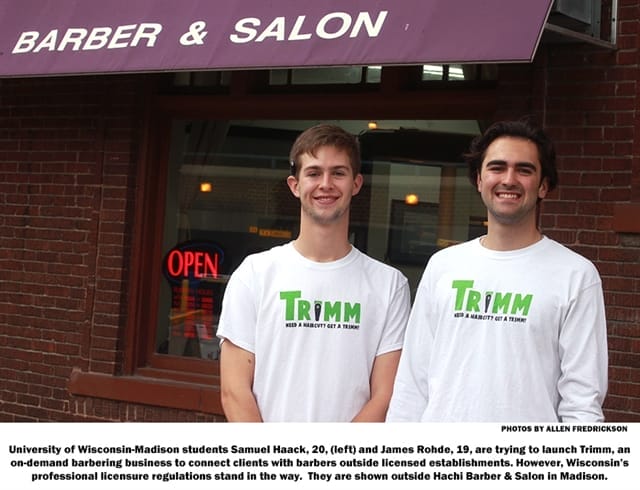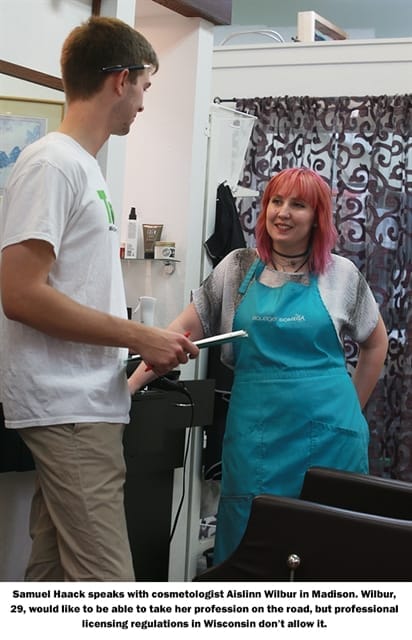UW students can’t launch Uber-like haircut business in Wisconsin without action from Legislature
Editor’s Note: On Nov. 27, 2017, Gov. Scott Walker signed into law licensure reforms that allow barbers, cosmetologists and other beauty professionals to provide services outside of salons or shops to all customers.
Part of a series of WPRI stories and research on the issue of professional licensing in Wisconsin.
Madison — A couple of University of Wisconsin-Madison undergrads want to put the Badger state on the cutting edge of the gig economy — one haircut at a time.
However, Wisconsin’s professional licensure system stands in their way and in the way of a growing segment of consumers who want services and products delivered in less traditional ways, faster and more efficiently.

Samuel Haack, 20, and James Rohde, 19, have formed the company Trimm Haircuts “to transform the antiquated haircutting industry to meet the needs of a modern market.”
Trimm works off a digital platform, much like Uber and Airbnb.
A Trimm client would use the mobile app or website (trimmhaircuts.com) to connect with a barber nearby, similar to how Uber connects a ride-sharer with a driver. The barber would come to the consumer’s home, place of business, hotel room or other location to provide the haircut there.
“The problem with the current system is that the time at which clients want to get their haircut is not when barbers are offering them. Most young professionals get out of work around 5 to 6 p.m., and this is when the majority of barber shops are closing,” says Haack, Trimm’s chief executive officer.
Trimm is among the first few enterprises in the United States offering a digital platform to link clients to hair-care professionals.
However, as it stands today, the startup cannot launch in Wisconsin because the state does not allow licensed barbers and cosmetologists to provide services outside of licensed establishments. The few exceptions include nursing homes and hospital rooms.
Despite the law, many hair stylists in Wisconsin do operate out of their homes or at venues such as wedding sites, at least on an occasional basis, according to Haack.
“We found that even where this regulation exists, such as in Wisconsin, California and New York, (the government) doesn’t enforce it,” says Haack, a New York native who majors in economics and political science with a background in computer science. He will be a junior this fall.
“It’s the least best-kept secret about barbering and stylists,” he says. “As we’ve worked with barbers personally and interviewed them about it, they say ‘everyone does it.’ ”
There are a couple of Trimm competitors in California and New York, but they are operating illegally, he says.
Other states are easing regulations

Some states have recently abolished their bans on licensed barbers and stylists providing services outside of licensed establishments, Haack says. “Most notably, Massachusetts in 2016 made it legal for barbers to operate outside licensed establishments,” he says.
The regulation “is kind of irrelevant and ineffective if the state’s not enforcing it,” Haack says, adding, “It’s cash-based, under-the-table, untaxed income.” Licensure reform would benefit Wisconsin because that income would become taxable and would add revenue to the state’s coffers, he says.
Rohde, Trimm’s chief operating officer, and Haack have appealed to state Sen. Chris Kapenga (R-Delafield) for help. The senator has introduced legislation to eliminate some of the onerous licensing requirements that barbers and cosmetologists face in Wisconsin. One measure being considered in Madison would allow licensed hair-care professionals to provide services outside of licensed establishments.
Creating the business model
Haack and Rohde, Beta Theta Pi fraternity brothers, developed Trimm for a business-plan competition sponsored by the UW School of Business. Rohde is a Wisconsin native majoring in real estate in the School of Business. He will be a sophomore this fall.
The pair recruited fellow fraternity member Harry Hochwarter, 20, to develop the website and mobile app.
Trimm would work with independent contractors much the way Uber does with its drivers. It would perform background checks on the barbers, keep their state license numbers on file, share with potential clients a menu of the barbers’ services and prices and even upload photos of haircuts they have done.
Clients would be able to rate barbers on the Trimm platforms, and the website or mobile app would connect the clients with barbers and act as the scheduler.
Not only is a service like Trimm attractive to younger consumers, who are increasingly reliant on electronic devices for everyday tasks, it gives more flexibility to barbers, Haack says.

Many young barbers and cosmetologists are coming out of school with significant debt, and they go to work in shops for low wages or work for commission, he says. Easing the state’s licensure rules would give them more employment options and independence.
In addition, owners of brick-and-mortar establishments are seeing slimmer profit margins. Commercial rental rates in urban areas nationally have increased by about 20 percent over the past five years, while the cost of a men’s haircut has remained steady around $28 nationally during the same period, Haack and Rohde found in their research.
“This makes it increasingly challenging for new hair-care professionals to start their own businesses and for existing establishments to stay out of the red,” Haack says.
The pair have been working with Madison-area barbers and stylists in developing their business. Among them is Aislinn Wilbur, a licensed cosmetology manager who works at Hachi Barber & Salon in Madison.
“Aislinn has quite a bit of debt from cosmetology school,” Haack says. “She also has a passion for being mobile and traveling.”
Wilbur, 29, would like to take her profession on the road, cutting hair all over the country while being able to experience new places. “She feels bound to this physical location,” Haack says. “She wants to be independent and free to move around.”
Trimm “can give her the ability to be her own business, work when she wants to and also work on the road, all while keeping more of her income and paying off her student loans.”
The entrepreneurs hope to launch Trimm this fall — and they hope to do it in Wisconsin.
“I came to UW-Madison because of its stellar reputation of being so innovative and entrepreneur-friendly,” Haack says, adding, “I want to stay in Wisconsin after graduating to run Trimm, instead of leaving.”
But, he admits, the state’s licensure rules put him in a tough spot. If the Wisconsin Legislature does not approve licensure reform, the pair will likely take their venture to a state with fewer regulatory obstacles, such as Massachusetts, Haack says.
Betsy Thatcher of Menomonee Falls is a freelance writer and a former Milwaukee Journal Sentinel reporter.
Read WPRI’s “Government’s Love for Licensure” report here.
Watch video of Albert Walker’s story here. Read his story here.
Watch video of Krissy Hudack’s story here. Read her story here.
Watch video of Cassie Mrotek’s story here. Read her story here.




